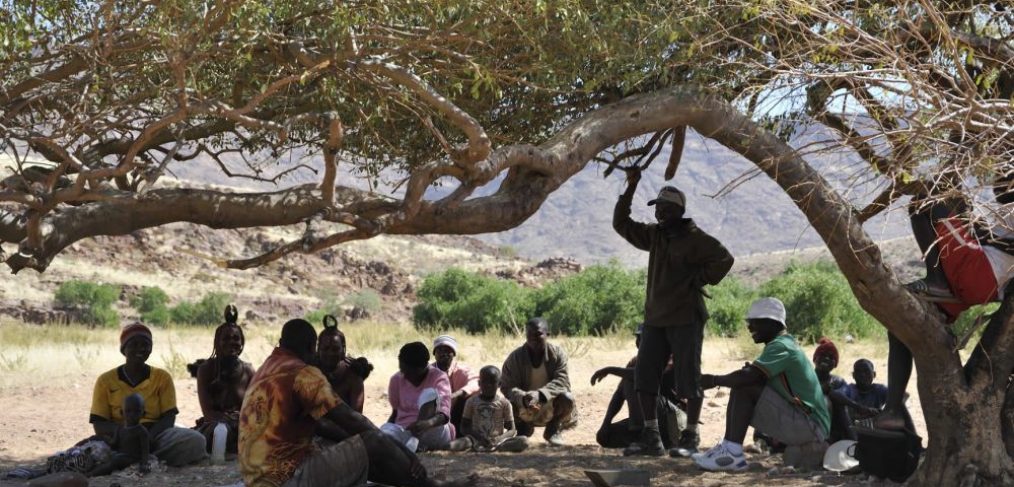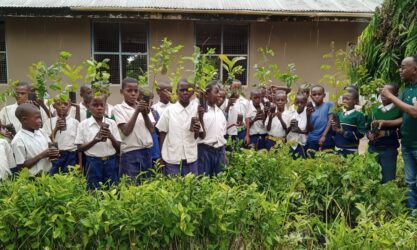
Open Letter: Enable conservation, uphold human rights in Africa
As representatives of millions of rural Africans, the majority of whom live below the poverty line, we are urgently appealing to you to assist us by preventing the undermining of our globally recognised conservation efforts and our basic human right to sustainably use the natural resources on which our communities’ livelihoods depend.
Over the last few years there have been increasing calls in many European countries to ban the import of trophies from animals hunted in Africa, in the mistaken belief that this will enhance the conservation of iconic African species such as elephants and lions. Such a move will have devastating consequences not only for conservation and our livelihoods but will also undermine our human right to sustainably manage our natural resources, a right clearly recognised in international and national law. We share a passion for wildlife conservation, it is a way of life for us and is deeply ingrained in our culture, traditions and rural economies. But without markets for high value hunting low impact hunting, we will not be able to sustain conservation or feed our children.
We take this opportunity to share our perspectives and realities and ensure that our voice and informs decision making that affects our lives. Successful conservation must start with those of us who live alongside dangerous large animals. During colonial times, European colonists removed our rights to manage and benefit from these animals, and in many instances forcefully evicted us from our lands, often to make way for protected areas. This led to dramatic loss of wildlife and habitat – a disaster for conservation, our traditions and our livelihoods. Post-independent governments restored our rights, integrating wildlife into rural economies through inclusive conservation approaches. This provides us with socio-economic incentives to live with and sustainably manage our wildlife.
Whilst it varies from country to country, 50 – 90% of these economic incentives come from sustainable, regulated, humane and scientifically verified hunting methods. This has led, in southern African countries, to increasing wildlife populations and habitat expansion, in stark contrast to other regions in the world where biodiversity loss and habitat destruction accelerate at disastrous rates.
Although many view elephants, lions and other wildlife through a romantic, idealised lens, our daily reality of living with these valued, yet dangerous animals, requires more pragmatism. We worry daily that our children may be killed on their way to school, or that our ability to provide for our families will be destroyed within a few hours by elephants in our fields or large predators among our livestock. Some facts for consideration:
• In Zimbabwe at least 30 people were killed by elephants in 2019 and it appears that the number of deaths will increase in 2020.
• In Botswana, elephants killed 36 people in 2018, injured dozens more and destroyed the livelihoods of thousands.
• Recently, two Zimbabwean siblings disappeared from their home. Only the dismembered head of the two-year-old was recovered from the suspected hyena attack and the four-year-old has never been found.
Likewise in all our countries, similar incidents occur and escalate year by year as wildlife numbers increase. Despite this, elephants, lions and other animals live amongst us – not only in protected areas – and are multiplying because we want them to. Hunting is the key component that makes wildlife valuable to us. The consequences of ignoring or failing to encourage and incentivise community involvement in conservation in social contexts steeped in poverty are all too familiar to us. The harsh reality is that if incentives for us to conserve and share our land with wildlife are removed, their future in Southern Africa will be as bleak as that of large predators that were once plentiful in other parts of the world.
We appreciate that for those many people not familiar with the realities of rural Africa, hunting may seem a counter-intuitive conservation strategy. But if the objective is conservation – not solely recognising individual animal rights – it is necessary to understand the context of coexisting with dangerous wildlife. Consider our perspectives, evidence base, and success stories from a conservation method that recognises the basic human right of our peoples to manage and benefit from the sustainable use of our natural resources. If we cannot feed our families through humane and sustainable use of wildlife, we will have no option but to adopt land use practices that will destroy our beautiful natural landscapes and exterminate our treasured wild animals – an all too familiar situation throughout the world.
It will be no news to you that many of our countries are not wealthy or endowed with rich resources. One of those which we do have, wildlife, is demonstrably managed responsibly and sustainably. We are tired of people from elsewhere, far removed from our realities, talking on our behalf, misrepresenting our success and dismissing these as ‘myths’ such as this campaign.
We are an integral part of the solution to illegal wildlife trade, poaching and unsustainable use of biodiversity. It is disappointing that while animal protectionist campaigns – which we do not confuse with the valued conservation efforts of many conservation organisations – to stop hunting have raised enormous sums of money, we have yet to see evidence of those funds conserving African wildlife or benefiting any of our communities in their role as custodians of that wildlife. What and who do these campaigns benefit? Their impact will be to remove our incentives to manage and live side by side with wildlife. Imposing worldviews and value systems from faraway places, results in disastrous policies that undermine our rights and conservation success.
We welcome international interest and support for conservation in our countries. Indeed, the international community has been instrumental in our success to date through significant investment over 35 years in our Community Based Natural Resource Management (CBNRM) programmes. Such support has been forthcoming from the US, the EU and multi-lateral organisations such as IUCN, UNDP and UNEP, along with conservation organisations such as WWF. It is therefore with dismay that we now hear that these same successful programmes and our human rights are under serious threat from those countries and organisations who have been our allies and supporters for decades.
We respectfully request that you hear our voices. Our conservation successes and lived realities are not ‘myths’. We trust that you will agree that our human right to sustainably manage the natural resources on which we rely for our livelihoods should not negotiable. Anything less is to put the rights of animals before the rights of African’s.
We write this letter at a time when we trust it will have particular resonance as throughout the world there is increasing acknowledgement of the need to address past and present wrongs stemming from racism, social and environmental injustice, structural inequalities and imposition of Western values and belief systems based on privilege. Black lives matter, everywhere.
Signed for and on behalf of:
Nano Cruz, President, Green Nation Association, Angola
Botshelo Sesinyi, Manager, Okavango Community Trust, Botswana
Siyoka Simasiku, Director, NCONGO, Botswana
Dick George, Director, Maun Snake Capture, Botswana
Chifundo Dalireni , Programme Coordinator, Wildlife and Environment Society of Malawi
Malidadi Berlings Langa, Chairperson, Kasungu Wildlife Conservation for Community Development Association (KAWICCODA), Malawi
Dorothy Malesu Manga, Namibia , Sikunga Conservancy- Committee member of the Conservancy
Lorna Dax , Namibia , ≠Khoadi-//Hôas Conservancy – Conservancy Manager
Mervin //Gaseb , Tsiseb Conservancy, Namibia – Chairperson
Iyambo !Naruseb , Namibia , Otjimboyo Conservancy- Chairperson
Zak Dirkse, !Khob !Naub Conservancy Southern Namibia – Chairperson
Hilda Nakathinge , Sheya Shuushona Conservancy , North Central Regions , Namibia – Chairperson
John Bobby Itengula, Ipumbu Ya Tshilongo Conservancy , Omusati Region North Central Region, Namibia – Chairperson
Eva N. Iikondja, Namibia Uukwaludhi Conservancy – Chairperson
Max Junior Wa Midhi , Namibia, Muduva Nyangana Conservancy, Kavango East Regions , Namibia-Chairperson
Gerson //Aiseb , Chairperson, Sorris Sorris Conservancy, Southern Kunene, Namibia
Echanis Mutoma, Chairperson Mayuni Conservancy, Zambezi, Namibia
Cletius Maketo, Chairperson Sikunga Conservancy, Zambezi, Namibia
Simasiku Fransisca, Chairperson, Kasika Conservancy, Zambezi, Namibia
Martin Ngonga, Chairperson, Dzoti Conservancy, Zambezi, Namibia
Kadima Shine, Chairperson, Mashi Conservancy, Zambezi, Namibia
Nyama Morgan, Chairperson, Wuparo Conservancy, Zambezi, Namibia
Masangu Leonard, Chairperson, Kabulabula Conservancy, Namibia
Muchila Ryco, Chairperson, Nakabolelelwa Conservancy, Namibia
Saisai Doreen, Chairperson, Salamabala Conservancy, Namibia
Ntelamo Eugene, Chairperson, Bamunu Conservancy, Namibia
Slysken Sampofu, Chairperson, Balyerwa Conservancy, Namibia.
Dr Lamson Makuleke, Makuleke People, South Africa;
Fadhili Njilima , Tanzania Africa Wildlife Foundation;
Dr Rodgers Lubilo, Chair, Zambia CBNRM Forum
Felix Shanungu, President, National Community Resources Board Association
Bupe Banda, Zambia CBNRM Forum
Bulilima District Never Ncube CAMPFIRE Inter-ward Chairperson, Zimbabwe
Delani Mabhena Councillor Malanswazi Ward, Zimbabwe
Phillip Mpofu CAMPFIRE Chairperson Khame Ward, Zimbabwe
Zoolakes Nyathi Council Chairperson, Zimbabwe
Isaac Msebele CAMPFIRE Chairperson Ndolwane Ward, Zimbabwe
Land Ndebele Finance Committee Chairperson; Zimbabwe
Innocent Mavunela Conservation Committee Chairperson Chipinge District, Zimbabwe
Patson Simango CAMPFIRE Chairperson Mahenye Ward, Zimbabwe
Liberty Chauke Campfire Association – Mahenye Communal land, Zimbabwe
Kumbula Jimmy CAMPFIRE Chairperson Mtandahwe Ward, Zimbabwe
Naison Ndhlovu Mahenye Ward Councillor, Zimbabwe
- Njanjeni Mtandahwe Ward Councillor Hwange District, Zimbabwe
Nyalani Mgaduwi CAMPFIRE Chairperson Sidinda Ward, Zimbabwe
Sinikiwe Nyathi Sidinda Ward Councillor, Zimbabwe
Jabulani Ndubiwa, CAMPFIRE Elder Jambezi Ward Mbire District, Zimbabwe
Ishmael Chaukura CAMPFIRE Inter-ward Chairperson Masoka Ward Zimbabwe
Promotion Dzomba Village Head Masoka Ward, Zimbabwe
Sarudzai Goredema CAMPFIRE Chairperson Masoka Ward, Zimbabwe
Oscar Marowa Committee Member Masoka Ward, Zimbabwe
Public Museruka Committee member Angwa Ward, Zimbabwe
Ishmael Jack CAMPFIRE Vice Chairperson Angwa Ward, Zimbabwe
Julius Chokubooka CAMPFIRE Treasurer Angwa Ward, Zimbabwe
Justin Mawachi CAMPFIRE Secretary Angwa Ward, Zimbabwe
Cossam Chikondoma CAMPFIRE Vice Secretary Angwa Ward Tsholotsho , Zimbabwe
Godfrey Ndlovu CAMPFIRE Inter-ward Chairperson, Zimbabwe
Chief Tategulu, Zimbabwe
Chief Matupula, Zimbabwe
Chief Siphoso, Zimbabwe
Chief Shana, Zimbabwe

